
ARCHIVE FOR MATHEMATICAL LOGIC
Scope & Guideline
Charting New Territories in Mathematical Inquiry
Introduction
Aims and Scopes
- Model Theory and its Applications:
The journal regularly features papers exploring model theory, including definability, saturation, and the relationships between models and algebraic structures. - Set Theory and its Foundations:
A significant focus is on set theory, including topics like forcing, cardinality, and the continuum hypothesis, which are foundational to understanding mathematical logic. - Computability and Recursive Functions:
Papers addressing computability, Turing degrees, and related areas highlight the journal's commitment to exploring the limits of computation and complexity. - Algebraic Structures in Logic:
The journal includes research on the interaction between algebra and logic, covering topics like the structure of rings, groups, and semigroups within logical frameworks. - Proof Theory and Logical Systems:
Research in proof theory, including cut elimination and the properties of various logical systems, is a recurring theme, emphasizing the foundational aspects of mathematical reasoning. - Philosophical Implications of Logic:
Some articles delve into the philosophical ramifications of logical principles, exploring the implications of logical systems on broader mathematical and epistemological questions.
Trending and Emerging
- Advanced Set Theory Techniques:
There is a noticeable increase in research employing advanced techniques in set theory, particularly in the context of forcing and large cardinals, suggesting a revitalization of interest in these foundational areas. - Intersections of Logic with Topology and Analysis:
The trend toward exploring the connections between logic, topology, and analysis is growing, with papers discussing topics like metric structures and topological dynamics. - Applications of Logic in Computability and Complexity:
Recent papers emphasize the applications of logic in understanding computability and complexity theory, reflecting a broader trend of integrating logical frameworks with computational issues. - Non-Classical Logic Systems:
An emerging focus on non-classical logics, including intuitionistic logic and modal logics, highlights a shift toward exploring alternative logical systems and their implications. - Game Theory and Logic:
The intersection of game theory and logic is gaining traction, with research exploring the logical foundations of games and their implications for understanding mathematical structures.
Declining or Waning
- Classical Logic and Standard Theories:
Research on classical logic and standard theories seems to be waning, as more attention shifts toward non-standard logics and their applications in modern contexts. - Elementary Model Theory:
While foundational, elementary model theory appears to be less frequently addressed in recent issues, possibly due to the growing interest in more complex structures and higher-order logics. - Historical Perspectives on Logic:
Papers exploring historical perspectives and the evolution of logical theories are becoming less common, indicating a shift toward more contemporary issues and applications. - Basic Combinatorial Set Theory:
Topics in basic combinatorial set theory have diminished, as researchers may be focusing on more intricate aspects of set theory and its applications in other areas.
Similar Journals
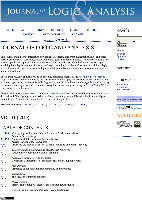
Journal of Logic and Analysis
Illuminating Complex Frameworks in Logic and AnalysisThe Journal of Logic and Analysis is an esteemed scholarly periodical dedicated to the fields of logic and mathematical analysis, published by JOURNAL LOGIC & ANALYSIS. This Open Access journal, operational since 2009, provides researchers, professionals, and students with unrestricted access to cutting-edge research and advancements in these critical areas of study. Based in the United States, it has garnered attention for its interdisciplinary approach, contributing significantly to the academic community's understanding of complex logical frameworks and analytical techniques. The journal's recent Scopus rankings indicate its competitive standing within its categories, including Q3 in Analysis and Logic, as well as Modeling and Simulation, showcasing its relevance and impact within these domains. By fostering innovative research and collaboration, The Journal of Logic and Analysis plays a vital role in the advancement of knowledge and scholarship in mathematics and its applications.

Logic and Logical Philosophy
Navigating the Nexus of Logic and PhilosophyLogic and Logical Philosophy is a distinguished journal published by Nicolaus Copernicus University Torun, Poland. With its ISSN 1425-3305 and E-ISSN 2300-9802, the journal has established itself as a premier outlet for cutting-edge research in the field of philosophy, specifically focusing on the intricate intersections of logic and philosophical inquiry. Since its inception, the journal has consistently demonstrated its impact within the academic community, achieving a commendable Q1 ranking in the 2023 Arts and Humanities category, placing it in the 73rd percentile of publications in the field. The journal aims to foster scholarly dialogue and contribute significantly to the advancement of philosophical understanding through rigorous research articles, critical reviews, and discussions. With a commitment to high academic standards and accessibility—though specific access options may vary—Logic and Logical Philosophy remains an essential resource for researchers, professionals, and students alike, paving the way for innovative philosophical discourse until 2024 and beyond.
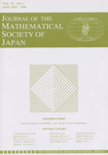
JOURNAL OF THE MATHEMATICAL SOCIETY OF JAPAN
Cultivating Knowledge and Innovation in MathematicsJournal of the Mathematical Society of Japan, established in 1948, is a premier scholarly journal dedicated to advancing mathematical research and discourse. Published by the esteemed Mathematical Society of Japan, this journal has consistently achieved recognition for its rigorous and innovative contributions to the field, achieving a prestigious Q1 category ranking in miscellaneous mathematics as of 2023. Although it maintains a subscription-based access model, the journal remains an invaluable resource for researchers, professionals, and students alike, fostering a deeper understanding and exploration of mathematics across various disciplines. With a focus on disseminating high-quality original research, reviews, and comprehensive articles, the Journal of the Mathematical Society of Japan plays a crucial role in the global mathematical community and continues to influence new generations of mathematicians through its commitment to excellence.
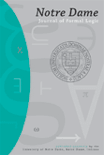
Notre Dame Journal of Formal Logic
Illuminating the Foundations of Logical InquiryNotre Dame Journal of Formal Logic is a premier academic publication dedicated to the advancement of research in the field of logical studies. Published by DUKE UNIVERSITY PRESS, this journal has been a significant contributor to the discipline since its inception in 1960, with an impressive convergence of scholarly articles expected to continue through 2024. With its focus on rigorous formal logic, the journal plays a crucial role in fostering discussions that bridge mathematics and philosophical inquiry, holding a notable Q2 ranking in the 2023 Logic category. Despite its non-open-access status, the journal reaches a wide audience of researchers, professionals, and students committed to exploring the foundational aspects of logics. Located in Durham, NC, it provides a platform for innovative thought and critical engagement within the logic community. With its impactful contributions, the Notre Dame Journal of Formal Logic stands as a vital resource for those seeking to deepen their understanding of both classic and contemporary logical theories.

Australasian Journal of Logic
Exploring the depths of logic and reasoning.The Australasian Journal of Logic is a prominent scholarly publication in the field of logic, published by the Australasian Association for Logic. With an ISSN of 1448-5052, this journal serves as a vital platform for disseminating research that advances the understanding and application of logical theory and its intersection with various disciplines. Although it is not open access, its rigorously peer-reviewed articles cater to academics, researchers, and students keen on exploring contemporary issues in logic both in theoretical and practical domains. The journal aims to foster scholarly communication and collaboration within the logic community, encouraging the exchange of ideas and insights that shape the future of logical studies. By contributing to the growing body of knowledge in this essential field, the Australasian Journal of Logic plays a crucial role in enhancing the intellectual landscape of logic research.
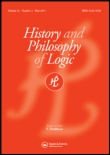
HISTORY AND PHILOSOPHY OF LOGIC
Exploring the Nexus of Thought and TimeHISTORY AND PHILOSOPHY OF LOGIC is a prestigious journal published by Taylor & Francis Ltd, focusing on the intricate relationships between historical contexts and philosophical inquiries within the realm of logic. With its ISSN 0144-5340 and E-ISSN 1464-5149, the journal has established itself as a vital academic resource since its inception in 1980 and will continue to contribute to the field until 2024. It holds an impressive status, ranking in the Q1 category in History and Q2 in History and Philosophy of Science according to the 2023 category quartiles. This journal is recognized for its high-impact research, achieving notable positions in Scopus ranks, including 80th percentile in Arts and Humanities - History and 58th percentile in History and Philosophy of Science. Although it does not offer open access, it remains a crucial platform for scholars, researchers, and students aiming to explore and advance knowledge at the intersection of logic's history and its philosophical implications.
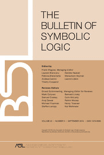
BULLETIN OF SYMBOLIC LOGIC
Cultivating Knowledge in Logic and PhilosophyBULLETIN OF SYMBOLIC LOGIC, published by Cambridge University Press, is a distinguished academic journal that serves as an essential platform for the dissemination of research in the realms of logic and philosophy. Since its inception in 1995, this journal has progressed through its convergence years and remains committed to fostering intellectual discourse among scholars. With a 2023 ranking in the Q1 category of Philosophy and a Q3 classification in Logic, it continues to uphold its reputation as a significant contributor to the field. While operating under a traditional subscription model, the journal dedicates itself to publishing high-quality articles that explore foundational issues, advanced theories, and innovative insights in symbolic logic. Researchers, professionals, and students will find invaluable resources within its pages, particularly as it ranks favorably among peers, with noteworthy standings in Scopus rankings. For those seeking to deepen their understanding of logical frameworks and their philosophical implications, BULLETIN OF SYMBOLIC LOGIC is an indispensable resource.

Pure and Applied Mathematics Quarterly
Advancing the Frontiers of Mathematical KnowledgePure and Applied Mathematics Quarterly is a prestigious journal published by INT PRESS BOSTON, INC, focusing on the diverse and evolving field of mathematics. Since its inception in 2007, this journal has grown significantly, currently holding a Q1 ranking in the Mathematics (Miscellaneous) category for 2023, positioning it among the leading publications in the discipline. With a commitment to publishing high-quality research, Pure and Applied Mathematics Quarterly fosters innovation and dialogue within the mathematical community by providing a platform for theoretical advancements and practical applications. The journal remains accessible to researchers and professionals through its ISSN 1558-8599 and E-ISSN 1558-8602, although it does not currently offer open access. As a vital resource for mathematicians, educators, and students, this journal endeavors to expand the frontiers of mathematical knowledge and contribute to the academic dialogue surrounding this fundamental science.
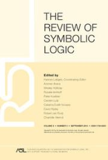
Review of Symbolic Logic
Advancing the Frontiers of Logical ThoughtReview of Symbolic Logic is a prestigious academic journal published by Cambridge University Press, dedicated to advancing the field of logic through critical analysis and innovative research. Established in 2008, the journal has become a key fixture in the academic community, particularly recognized for its contributions in the realms of logic, mathematics (miscellaneous), and philosophy. With an impressive classification of Q1 across multiple categories in 2023, it ranks within the top echelons of its field, standing at 15th out of 41 in Logic and 29th out of 90 in miscellaneous mathematics, positioning itself as essential reading for scholars and practitioners alike. Although not Open Access, the journal offers robust access options through institutional subscriptions, providing an expansive platform for the dissemination of high-quality research. Review of Symbolic Logic aims to foster a deeper understanding of symbolic logic's applications and implications while inspiring emerging scholars and seasoned researchers to further the dialogue within this vibrant area of study.
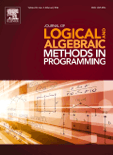
Journal of Logical and Algebraic Methods in Programming
Elevating Scholarly Discourse in Theoretical Computer Science.The Journal of Logical and Algebraic Methods in Programming (ISSN: 2352-2208, E-ISSN: 2352-2216) is a prestigious publication by Elsevier Science Inc, dedicated to advancing the fields of computational theory, programming logic, and mathematical methodologies. Esteemed in its commitment to high-quality research, this journal holds a Q2 ranking in 2023 for Computational Theory and Mathematics, and is recognized in various other disciplines including Logic and Software Studies. The journal’s open access policy enhances its visibility and accessibility, ensuring that cutting-edge research reaches a wider audience of researchers, professionals, and students. With an impressive convergence timeline from 2014 to 2025, it is a vital resource for those seeking to explore innovative algorithms and their applications in diverse areas of informatics. The Journal of Logical and Algebraic Methods in Programming represents a unique intersection of logic, mathematics, and software, carving a significant place in the scholarly discourse of theoretical computer science.